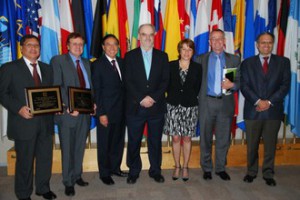In Washington DC, on April 26, the FONTAGRO awards ceremony 2012-2013 was held, for the contest on “Successful Cases of Innovations in Family Agriculture in Latin America,” where recognition was given to successful proposals for innovation in farming with small-scale producers and other stakeholders in the chain.
The winner in the category of “International and Multinational Research and Development Organizations” was the experience of the Papa Andina /INCOPA Project of the International Potato Center (CIP) entitled “Innovation to Value the Biodiversity of Native Potatoes: The Case of Papa Andina/INCOPA in Peru,” which was successful in improving the competitiveness of the potato sector (especially of the native potato segment) in Peru, with the coordinated work of a series of public and private stakeholders.
This contest was organized by the Regional Fund for Agricultural Technology (FONTAGRO), together with the Inter-American Development Bank (BID) and the Inter-American Institute for Cooperation on Agriculture (IICA). The award was received by André Devaux and Miguel Ordinola, coordinators of Papa Andina and INCOPA, who thanked the organizers and emphasized the importance of investing in innovation, since this ensures very positive returns for the small-scale producers.
As part of the ceremony, the book “Innovations of Impact: Lessons from Family Agriculture in Latin America and the Caribbean” was presented, containing the winning CIP case and 14 other experiences of smallholder family agriculture in the region. In the publication, there is another experience supported by CIP, referring to integrated pest management and organic production.
Participating in the event were representatives of FONTAGRO’s Board of Directors, directors and specialists from the IDB and IICA as sponsors of the Fund, special guests from the sector, and strategic partners located in Washington DC.
 The experience of the INCOPA Project in Peru was implemented with a series of public and private stakeholders: the small-scale producers from Huánuco, Apurímac, and Puno; development institutions (CAPAC Perú, ADERS Perú, Plataforma de la Tunta); the Ministry of Agriculture; private companies (Autoservicios Wong, Pepsico); and multi-stakeholder platforms (Alianza de Aprendizaje, Iniciativa Papas Andinas). The Swiss Agency for Cooperation and Development (SDC) funded this experience throughout.
The experience of the INCOPA Project in Peru was implemented with a series of public and private stakeholders: the small-scale producers from Huánuco, Apurímac, and Puno; development institutions (CAPAC Perú, ADERS Perú, Plataforma de la Tunta); the Ministry of Agriculture; private companies (Autoservicios Wong, Pepsico); and multi-stakeholder platforms (Alianza de Aprendizaje, Iniciativa Papas Andinas). The Swiss Agency for Cooperation and Development (SDC) funded this experience throughout.
The words of Dr. Willem Jansen of the World Bank, concluding the discussion conducted in the framework of the award ceremony, mark important points of the prize-winning cases:
i) the process of innovation implies partnerships between the researchers and other stakeholders; ii) the changes generated are linked with market opportunities; iii) technical changes are not enough; rather, institutional changes are needed that will generate wider benefits; iv) the small-scale producers should be the focal points in the processes of promotion of innovation in family agriculture; v) to sustain the changes achieved, the farmers need to organize themselves to meet these challenges.
The winning cases will be widely publicized in Latin America, and also worldwide, since the English version of the book that systematizes the experiences is being prepared. This will enable an important process of replication to be carried out, as well as advocacy for the design of public policies.
